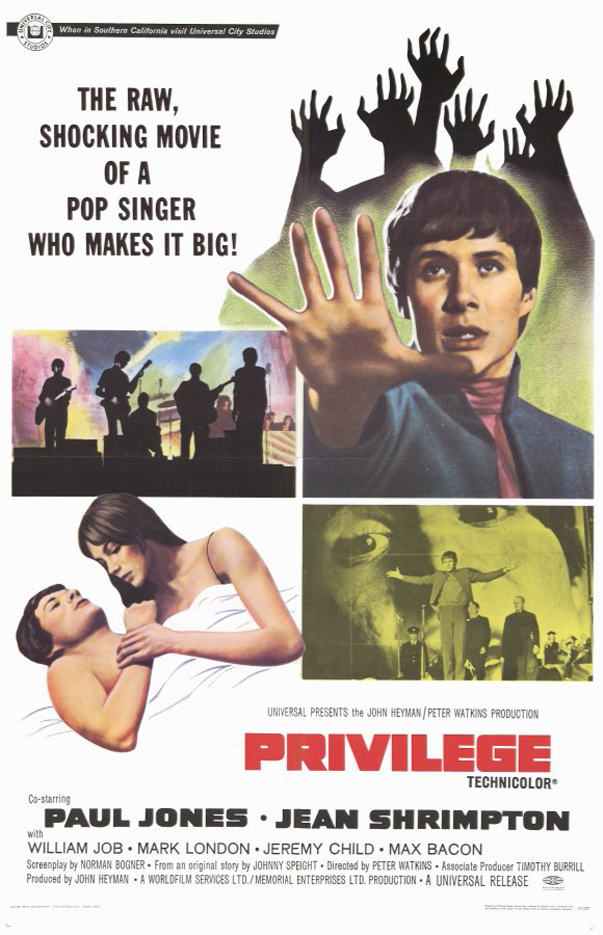
PRIVILEGE
(director/writer: Peter Watkins; screenwriters: Norman Bogner/John Speight; cinematographer: Peter Suschitzky; editor: John Trumper; music: Mike Leander; cast: Paul Jones (Steven Shorter), Jean Shrimpton (Vanessa Ritchie), Mark London (Alvin Kirsch), William Job (Andrew Butler), Jeremy Child (Martin Crossley), Max Bacon (Julie Jordan), James Cossins (Professor Tatham), Malcolm Rogers (Rev. Jeremy Tate), Michael Barrington (The Bishop of Essex); Runtime: 103; MPAA Rating: NR; producer: John Heyman; New Yorker Films; 1967-UK)
“Stanley Kubrick’s “A Clockwork Orange” (1971) picked up the same storyline and most thought he was a genius for doing so.”
Reviewed by Dennis Schwartz
Uncompromising and hard-hitting satire of the glittery rock scene being used by the Establishment to keep the masses quiet by giving them the thrills they think they want and by cleverly from behind the scenes having the industry moguls manage mind control on them through a combination of advertising techniques and the savvy selling of a personality cult so they can influence the youths to ape their heroes and conform. The government gets order and the businessmen make a lot of money, which turns out to be a win-win for their silent partnership.
The disturbing allegorical film, attempting to rock the boat of the big money-making reactionary music industry, was not well-received by most critics in its day and mysteriously disappeared in Universal’s vaults shortly after it flopped in the box office upon its theater release (it was taken off the market probably for political reasons). It was unfairly regarded by the media as an “immoral picture which mocked the Church, defied authority and encouraged youths in lewd practices.” Things I failed to see in the same light.
Peter Watkins (“The Gladiators”/”The War Game”/”Punishment Park”), someone I have admired for a long time as both a uniquely talented filmmaker and for his forthright well-conceived political views, in his first full-length feature after doing controversial films for the BBC directs using a documentary style and does so in a committed way to his subversive theme about the exploitation of the masses and the dumbing down of the music so it becomes for the most part reduced to superficiality. The filmmaker maintains that the consumer-minded public has unwittingly become creatures of the marketplace, where they are easily influenced by the hype thrown around by the ad men. One may find this too grandiose and generalized an argument, but what might have left question marks for some in the sixties cannot be questioned with the same certainty when viewed some forty years later when we can clearly see (if we want to) that what Watkins suggested has not only come to pass but it seems he might even have understated his case. “Privilege,” a power term that implies it can be used for either good or bad purposes, is intelligently written with both an absurd and serious side by writers Watkins, Norman Bogner and John Speight.
It’s set in England in the near future, in 1970, where a coalition government rules and the Conservative and Labour parties no longer have any real differences between them. Steven Shorter (Paul Jones, former singer with the Manfred Mann group) engagingly plays the somewhat fragile pretty boy rock idol given a ticker tape parade by his fans to celebrate his great success. The world-weary and seemingly joyless rocker rose from humble beginnings in Birmingham by using his violent past to his benefit to become a crowd favorite (they applaud him for willingly sharing his life experiences with them). When that ‘bad boy’ image reaches its maximum growth as far as its commercial appeal, Shorter’s cunning handlers get him to repent and accept ‘law and order’ and the Anglican church as his guiding light as he becomes a churchgoer and now has a ‘good boy’ image. Going through an agonizing period of self-doubt, the somewhat sympathetic rock star feels torn asunder by realizing he’s become a sell-out and is falsely presenting himself as a religious messiah figure and thereby is losing his individuality to follow a safe commercial corporate image. Shorter is influenced to rebel by his sincere artist girlfriend Vanessa Ritchie (Jean Shrimpton, famous Brit super models of the 1960s) and after appearing as the headliner in an evangelical rock concert rally in a packed football stadium (reminiscent of either a Billy Graham revival meeting or a Hitler youth rally) he appears at an award banquet and surprises everyone by going off script as he strikes out in his acceptance speech against the authorities, the system, the media and his herd-like followers by denouncing all of them as frauds. This leads to him being denounced by the State, Church, the mass media and his followers, and his popularity dwindles and his career is ruined.
Stanley Kubrick’s “A Clockwork Orange” (1971) picked up the same storyline and most thought he was a genius for doing so. Meanwhile Watkins’s more honest and disturbing film never got its proper recognition. Now that it’s out on DVD, during President George W. Bush’s oppressive tour of duty and in the wake of the misguided Tony Blair’s failed foreign policy decisions, the chillingly eerie film set in Swinging Britain seems more relevant and important than ever in taking a hard look at how the media manipulates the public in democratic countries (think Iraqi War!).
REVIEWED ON 7/29/2008 GRADE: A